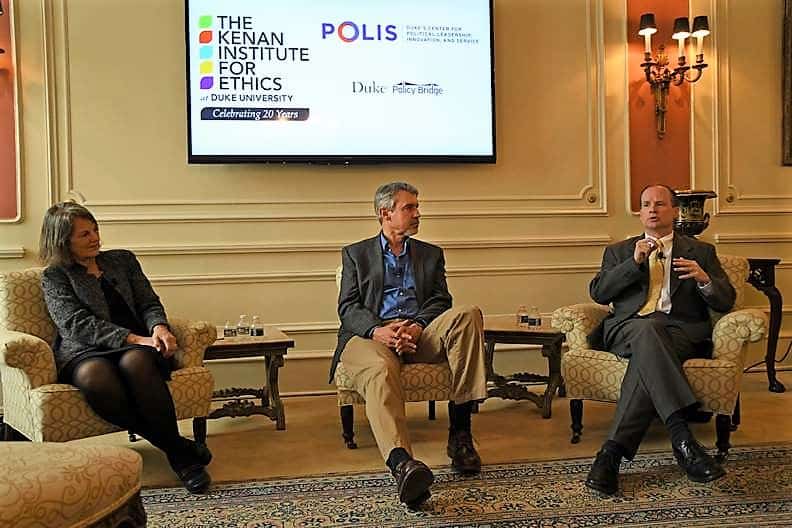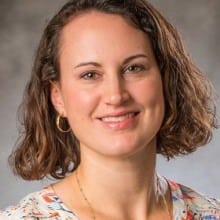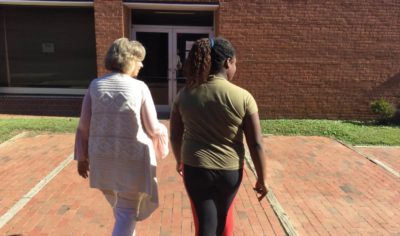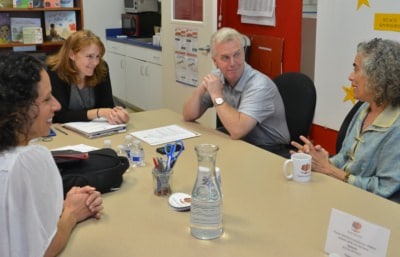Despite their opposing political viewpoints, John Hood and Leslie Winner encourage others to look past the heated polarization of today’s politics.
As Kenan Institute for Ethics’ Practitioners-in-Residence from April 3-7, 2017, the pair demonstrated how to work across ideological lines without compromising one’s own beliefs while meeting with students, faculty, staff, and the public. A week-long series of events was organized through Kenan, the Center for Political Leadership, Innovation, and Service (POLIS) and the Policy Bridge.
Hood, a conservative columnist and president of the John William Pope Foundation, and Winner, a former Democratic state senator and former executive director of the Z. Smith Reynolds Foundation, continually emphasized the value of relationships across party lines during their stay.
“We’ve been working for over a year on the idea that civil, constructive discourse is vital to the health of our democracy,” said Fritz Mayer, associate dean of the Sanford School and director of POLIS. “We want Duke to model ways our country can step back from the ledge of our current bitter partisan divide.”
Despite their ideological differences, Hood and Winner collaborate on a number of initiatives, including the Duke-affiliated North Carolina Leadership Forum, which brings together civic, business and political leaders from across the political spectrum to engage in thoughtful dialogue on important issues in the state.
“Both of us have been asked, ‘Why are you spending your time and energy trying to understand the other side when we should be focused on winning?'” Winner said in a meeting with students.
“In politics there’s no such thing as a permanent win, so the way that you win really matters,” noted Hood. “If you win by destroying relationships, weakening the public’s confidence in institutions, then it will hurt you in the long run.”
North Carolina – a “red and blue-striped state,” according to Winner – has significant challenges with polarization, but the Leadership Forum does not seek to find a compromise solution to the state’s problems. Civil discourse “isn’t a negotiation where you say 100 and I say 50, and the answer is 75,” Winner said in an interview.
Instead, the goal is to build mutual understanding and relationships between leaders. Hood and Winner said that even when there was no room for agreement on one topic, building a relationship based on trust and mutual respect for another person’s views allows for continued dialogue and the possibility of finding common ground in the future.
Bryce Cracknell, a junior studying public policy, said the display of camaraderie between Hood and Winner showed what a breakdown of polarization should look like.
“It was great to hear about the work they are doing in the state,” he said. “While I did not necessarily agree with every viewpoint expressed on a specific topic, it is nice to see two political adversaries working together to create a more fair democracy in North Carolina.”
Promoting civil discourse also doesn’t mean shying away from controversial issues. While on campus, Hood and Winner led an intensive seminar for students on whether North Carolina should increase the minimum wage. The students examined position papers from conservative and progressive experts on both sides of this issue. They also heard stories from minimum wage workers and business owners to better understand all sides of the issue.
“If you’re absolutely certain you are right, then there’s no room for discussion,” Winner said in a meeting. “Admitting ambiguity can help identify the common place where you can find creative solutions.”
Read the Duke Political Review’s interview with Hood and Winner.
Watch a video of a public talk on “Finding Common Ground in a Polarized World.”
Editor’s Note: This article is reprinted with permission. It originally appeared here in Duke Today.





